(64)エンゲルスによるマルクス主義最高の手引き書『反デューリング論』とは
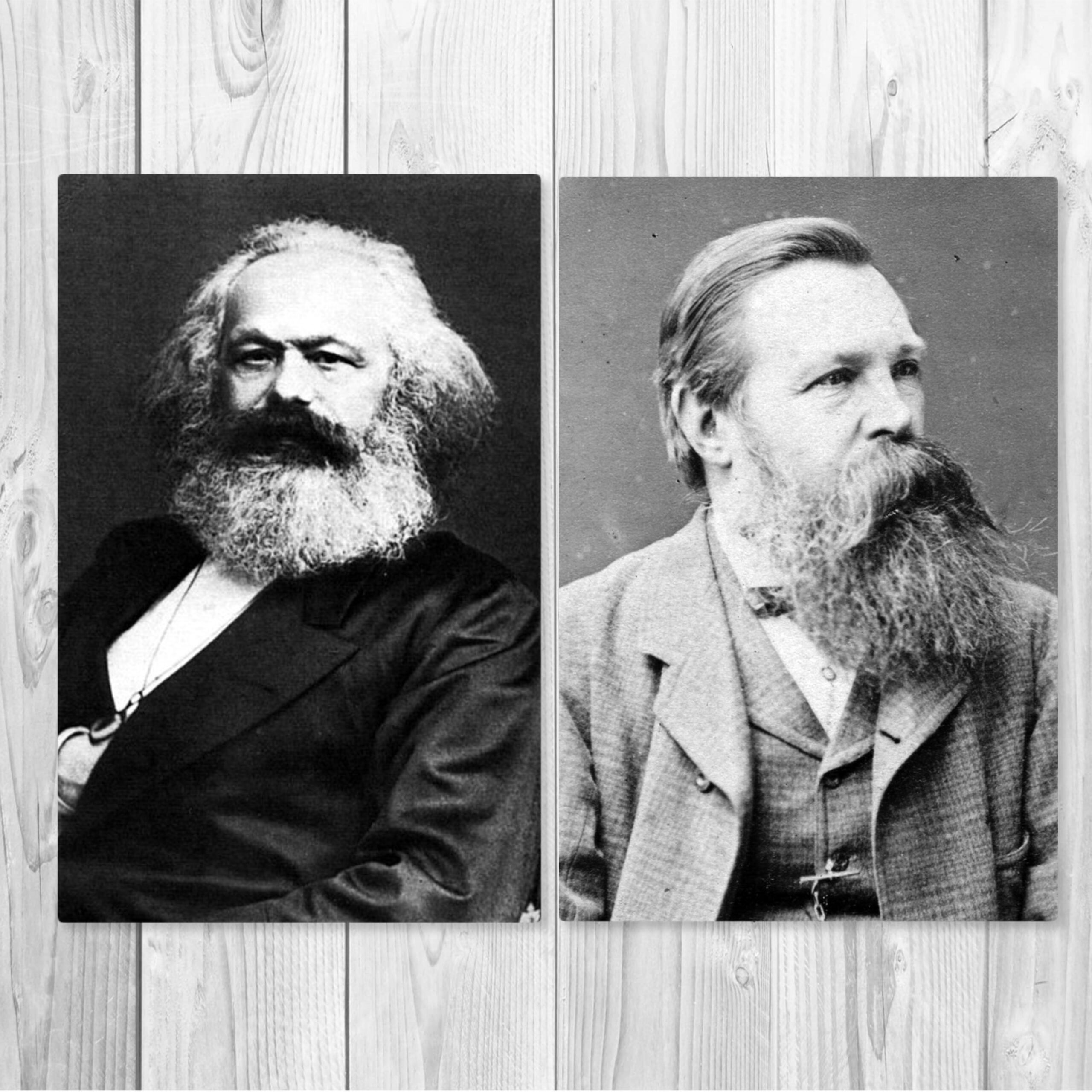
エンゲルスによるマルクス主義の最高の手引き書『反デューリング論』とは「マルクス・エンゲルスの生涯と思想背景に学ぶ」(64)
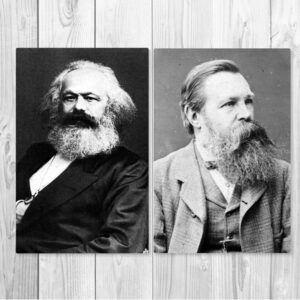
上の記事ではマルクスとエンゲルスの生涯を年表でざっくりとご紹介しましたが、このシリーズでは「マルクス・エンゲルスの生涯・思想背景に学ぶ」というテーマでより詳しくマルクスとエンゲルスの生涯と思想を見ていきます。
これから参考にしていくのはトリストラム・ハント著『エンゲルス マルクスに将軍と呼ばれた男』というエンゲルスの伝記です。
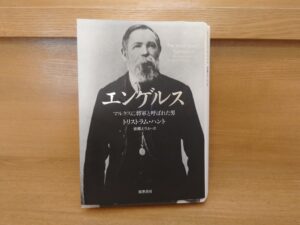
この本が優れているのは、エンゲルスがどのような思想に影響を受け、そこからどのように彼の著作が生み出されていったかがわかりやすく解説されている点です。
当時の時代背景や流行していた思想などと一緒に学ぶことができるので、歴史の流れが非常にわかりやすいです。エンゲルスとマルクスの思想がいかにして出来上がっていったのかがよくわかります。この本のおかげで次に何を読めばもっとマルクスとエンゲルスのことを知れるかという道筋もつけてもらえます。これはありがたかったです。
そしてこの本を読んだことでいかにエンゲルスがマルクスの著作に影響を与えていたかがわかりました。かなり驚きの内容です。
この本はエンゲルスの伝記ではありますが、マルクスのことも詳しく書かれています。マルクスの伝記や解説書を読むより、この本を読んだ方がよりマルクスのことを知ることができるのではないかと思ってしまうほど素晴らしい伝記でした。
一部マルクスの生涯や興味深いエピソードなどを補うために他のマルクス伝記も用いることもありますが、基本的にはこの本を中心にマルクスとエンゲルスの生涯についてじっくりと見ていきたいと思います。
その他参考書については以下の記事「マルクス伝記おすすめ12作品一覧~マルクス・エンゲルスの生涯・思想をより知るために」でまとめていますのでこちらもぜひご参照ください。
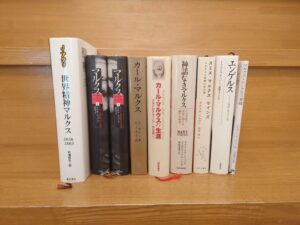
では、早速始めていきましょう。
エンゲルスが敵視したオイゲン・デューリングとは
『自然の弁証法』がエンゲルスの死後にしか出版されなかった理由の一つは、彼が研究を中断して、イデオロギー上のドタバタ劇という彼とマルクスのお気に入りの娯楽に耽ったためだった。
「君がおしゃべりするのはまったく結構なことだ」と、彼は一八七六年にマルクスに苛立ったふりをして書いた。「君はべッドにぬくぬくと横になり、何にも邪魔されることなく、一般的な地代について、とりわけロシアの農地の状況などを調べていられる。ところが、僕ときたら硬いべンチに座って、冷たいワインをがぶ飲みし、急に何もかもを中断して、退屈なデューリングに取り組まなければならないのだ」
彼らの怒りの的であるオイゲン・デューリングは、べルリン大学の盲目の哲学講師で、彼が説く社会主義はドイツの社会民主主義のなかに深く浸透し始めていた。
彼の初期の信奉者のなかには、エドゥアルト・べルンシュタインもいた。彼以前のバクーニンやプルードンと同様、デューリングはマルクスとエンゲルスによる中央集権制と経済決定論を批判し、代わりに労働者階級がより即座に物質的利益を確保できる漸進的な政治綱領を提案していた。
デューリングは「直接的政治力」を信じていて、ストライキ、集団行動、さらには暴力の効力すら、彼が理想とするヴィルツシャフトコミューネン―労働者の自治的コミューン―の社会制度を達成するために強調していた。
デューリングの街頭政治活動には明らかに人を惹きつけるものがあり、ドイツの主要な社会主義者の多くが、マルクスの難解で実現不可能に思われる哲学に代わる魅力的な主張と見なしていた。
そうしたことすべてがエンデルスを腹立たせた。「これほど甚だしい戯言を誰かが書いたことはいまだかつてない」と、彼は一八七六年七月にラムズゲートの夏の別荘からマルクスに書いた。
「口先ばかりの決まり文句だ―それ以外の何ものでもなく、まったくくだらないことが書き連ねてあるが、そのすべてがなかなか巧みに、著者が知り尽くした読者向けに取り繕われている。施し物を与え、わずかばかりの努力をするだけで、あらゆることを頭ごなしに命令したがる連中だ」。
さらに厄介なことに、デューリングも「口ンドンの老人たち」と同じくらい攻撃的にイデオロギーを闘わせる人間だった。
彼はマルクスを「愉快な科学的人物」として無視したが、本格的な癇癪は「シャム双生児」で、『イギリスにおける労働者階級の状態』で搾取する工場主の肖像を思いつくのに「自分自身を覗き込みさえすればよかった」エンゲルスに向けられた。
デューリングはエンゲルスのアキレス腱をじかに狙った。「資本は豊かだが、その資本についての洞察力は乏しい。彼は―エルサレムでかつて打ち立てられた由緒ある説に従って―針の穴を通れないロープだかラクダによくたとえられる輩の一人なのだ」〔新約聖書マタイ伝一九章二三節ほかの「金持ちが神の国に入るよりも、らくだが針の穴を通る方がまだ易しい」とするイエスの言葉。もとはアラム語でラクダと同音のロープが誤訳された可能性がある)〕
筑摩書房、トリストラム・ハント、東郷えりか訳『エンゲルス マルクスに将軍と呼ばれた男』P380-381
※一部改行しました
デューリングもバクーニンと同じく非常に強烈な存在で、しかもマルクス・エンゲルスの弱点を正確に見抜いていた厄介な存在でした。(バクーニンについては以下の記事「マルクスの共産主義が独裁的な国家権威主義になることを見抜いていたバクーニン「マルクスとエンゲルスの生涯と思想背景に学ぶ」(58)」を参照ください)
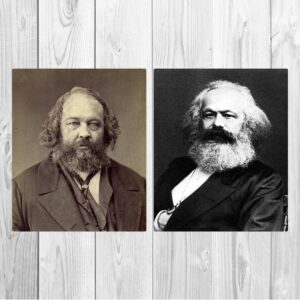
上の引用にありますように、「徹底的にブルジョワを攻撃しているエンゲルス自身がブルジョワであり、今では証券取引家となって莫大な資産を持っている矛盾」をデューリングはここで突いたのです。
この件については以前紹介した以下の記事でもお話ししていますのでこちらもぜひご参照ください。



そしてここを読んで思ったのですが、マルクス・エンゲルスとデューリングはその戦法が似ているのです。
相手を徹底的に叩き、こき下ろす。そうして多くの人に自分の絶対的な正当性を認めさせようとする。
エンゲルスは特にその攻撃の標的にされた怒りもあったでしょうが、同族嫌悪的なものもあったのではないかとも感じてしまいました。
エンゲルスの反撃『反デューリング論』
ヴィルヘルム・リープクネヒトに後押しされて、盲人を攻撃することにたいし当初いだいた良心の呵責も忘れ(「あの男は途方もなく傲慢なため、僕にはそんなことは考慮できない」)、エンゲルスはデューリングとその著作にたいする連続した非難を、ドイツの主要な社会主義の新聞『フォアヴェルツ』の紙面で始めた。
エンゲルスはデューリングの主張を、「誇大妄想症ゆえの精神的無能力」に過ぎないとしてあしらったが、その文章は通常のマルクス-エンゲルスの毒舌を超えて、「弁証法と共産主義世界の展望の」より広い定義と擁護にまで踏み込んだものとなった。
エンゲルスが『自然の弁証法』の雑記帳で研究していた弁証法的唯物論の哲学が、このころには洗練され、磨かれ、『オイゲン・デューリング氏の科学革命』として本の形式に整えられた。これは『反デューリング論』(一八七八年)としてより知られるようになった。
デューリングの魅力に対抗して、マルクス主義の科学を生き生きと人を惹きつける言葉で説明して反論するなかで、宣伝と普及活動の担当者としてのエンゲルスの優れた才能が、ことごとく発揮された。数学、生物学、物理学、化学に長年、没頭しつづけたあとで、エンゲルスは自分とマルクスの分析を、同じ科学的枠組に属するものと見なし始めていたのだ。(中略)
『反デューリング論』におけるエンゲルスの本当の功績は、自然科学に没頭して情報をふんだんに得たうえで、弁証法的唯物論を資本主義に応用したことだった。
エンゲルスの三つの法則―対立物の確執、量的変化から質的変化への転化、および否定の否定―は、いまや生物学、化学、進化だけでなく、ブルジョワ社会内部に存在する緊張までをも説明できるようになった。
「現代の資本主義の生産様式によって生じた生産力も、それによって確立した物資の流通システムも、生産そのものの様式と緊迫した矛盾に陥っている」と、彼は弁証法を用いてとうとうとまくしたてた。
「そのあまりに現代社会全体が消滅するのでないとすれば、生産と流通の様式における革命は起こらなければならない。あらゆる階級の区別には終止符が打たれるだろう」。
対立物は対立しなければならず、否定は否定され、蝶が蛹から羽化するように、新しい社会は内在する古い矛盾から生まれるのであった。社会の果てしなく移り変わる矛盾と、革命の準備の進み具合を読み取るこの重大な道具こそが、西洋思想へのマルクスの決定的な貢献だったのだ。
マルクスにとって、哲学の要点はいつも、世界をただ解釈するだけではなく、変えることだった。そして、弁証法的唯物論が政治的に示唆するものもまた『反デューリング論』の一節に明記されており、それは最終的にエンゲルスによって書き直され、『空想から科学へ』(一八八〇年、一八八ニ年)として別個に出版された。科学的社会主義により的を絞ったこの入門書をつくるアイデアは、マルクスの娘婿のポール・ラファルグからでたものだった。
筑摩書房、トリストラム・ハント、東郷えりか訳『エンゲルス マルクスに将軍と呼ばれた男』P381-384
※一部改行しました
こうして書かれることになった『反デューリング論』はマルクス主義が広まる上でとてつもないインパクトを与えることになりました。

そしてこの本の一部を抜粋して新たに書かれた『空想から科学へ』という本も同じようにマルクス主義への手引書として多くの人に親しまれることになります。この本については次の記事で改めて紹介します。
『反デューリング論』の反響
マルクス-エンゲルス協会の初代会長のダヴィト・リャザーノフによれば、『反デューリング論』はマルクス主義の歴史において画期的であった。
一八七〇年代後半に活動を始めた若い世代は、この本から科学的社会主義がなんであり、その哲学的前提や、その手法がなんであるかを学んだ……。特別な方法および特別な体系としてマルクス主義を普及させるのに、『資本論』そのものを除けば、『反デューリング論』ほど大きな影響をおよぼしたものはない。八〇年代初めに公の舞台に足を踏み入れた若いマルクス主義者はみな、この本を読んで育った」。
アウグスト・ベーべル、ゲオルギー・プレハーノフ、ヴィクトル・アドラー、エドゥアルト・べルンシュタイン(彼はエンゲルスの著書を読んだあとデューリングへの信念を撤回し、マルクス主義に転向した)といった人びとともに、カール・カウツキーはエンゲルスの手ほどきを受けて科学的社会主義を充分に理解するようになり、公の舞台にでるようになった世代の一人だった。
「『反デューリング論』が自分におよぼした影響から判断すると、マルクス主義を理解するうえでこれほど私に役立った本はほかにはない」と、彼は晩年に入って書いた。「マルクスの『資本論』はもちろん、より説得力のある作品だ。しかし、『反デューリンク論』を通して初めて、われわれは『資本論』を理解することを学び、それを正しく読むようになったのだ」
筑摩書房、トリストラム・ハント、東郷えりか訳『エンゲルス マルクスに将軍と呼ばれた男』P386-387
※一部改行しました
『反デューリング論』がどれだけマルクス主義の伝播に大きな影響を与えたかがよくわかります。
ですが、それに対して近年は「エンゲルスはマルクスを歪めて広めた。その後のマルクス主義が起こした出来事はエンゲルスがその原因である」という批判が強くなります。
はたしてエンゲルスは本当にマルクスを歪めたのか。それともマルクスの難解(理解不能)な思想を見事に噛み砕き解説したのか。これは大きな問題です。
これに対して著者は次のように述べます。少し長くなりますが非常に重要な箇所ですのでじっくりと読んでいきます。
エンゲルスは本当に『反デューリング論』でマルクスを歪めたのか?
それでも、西洋のマルクス主義学者のルカーチ・ジェルジに始まり、ジャン・ポール・サルトルやルイ・アルチュセールとともにつづいた別の思想の流れは、一八八〇年代にエンゲルスが体系化したものは本来のマルクス主義ではなかったと主張してきた。
あれは彼の唯物論であり、彼の弁証法で、彼の科学万能主義で、彼がへーゲルとマルクスを間違って結びつけたものなのだった。
「エンゲルスによる弁証法の説明から生じる誤解は、概してエンゲルスが―へーゲルの誤った導きに従って―この手法を自然にも応用した事実から生じる」と、ルカーチは述べた。「しかし、弁証法の重大な決定要因―主観と客観の相互関係、理論と実践の統合、カテゴリーの根底にある現実の歴史的変化が思考の変化の根本原因であることなど―は、自然に関するわれわれの知識には存在しない」。
『反デューリング論』や『空想から科学へ』に登場したマルクス主義はしたがって、「エンゲルスの創作」あるいは「エンゲルスの誤った考え」であって、それはマルクス主義思想のとんでもない誤解を表わしているのだった。
ノーマン・レヴィンの酷評によれば、「マルクス主義から最初に逸脱したのはエンゲルスだった。したがって、のちの独断主義や、後世のスターリンの唯物論的観念論の土台を築いたのはエンゲルス主義だったのである」。
その証拠として、これらの「真のマルクス主義者たち」は、マルクスとエンゲルスの文通が途切れた一連の期間を指摘する。それはマルクスがエンゲルスの後期の著作を決して認めず、友人の気持を傷つけずに、さりげなく距離を置こうとしていたことを示唆するものだった、というのだ。
二十世紀にマルクス主義にどのような大々的な改変が起きたにしろ、エンゲルスが故意にマルクス主義の理論を歪曲したとか、マルクスは彼とのあいだにもろい友情しかなかったため、意見の不一致を表明するのは彼(カール・マルクス!)には堪え難かったとほのめかすのは、マルクスとエンゲルスの関係を読み誤っている。
エンゲルスがマルクス主義を大衆化させたことについて、マルクスが恥じていたとか、懸念していた、という証拠はない。
それどころか、『反デューリング論』を最初に始めたのはマルクスであり、原稿はすべて読んでもらい、経済学の短い一節に寄稿しており、一八七八年には同書を「ドイツの社会主義を本当に理解するうえで非常に重要」であるとして推薦している。
実際にはマルクスも、エンゲルスと同様に、当時の科学の進歩に活気づけられていたのだ。「自然科学の分野ではとくに」、ヴィルヘルム・リープクネヒトが次のように追想している。
―物理学と化学を含め―また歴史においても、マルクスは新たに登場したものや進歩を逐一熱心に追っていた。そしてモレスコット、リービッヒ、ハクスリー―彼の「一般向け講義」にわれわれは根気強く出席した―は、われわれの仲間内でリカードやアダム・スミス、マカロック、それにスコットランドとアイルランドの経済学者と同じくらい、よく話題にのぼる名前だった。そして、ダーウィンが自分の調査の結果を引用し、それを世間に発表したとき、われわれは何カ月もダーウィンのことと、彼の科学的征服の革命的な力について語ってばかりいた。
マルクス自身も一八七〇年代にへーゲルの研究に引き戻されていたし、弁証法的な法則が自然にも社会にも当てはまることは彼が最初に主張している。
『反デューリング論』の壮大な理論体系をどう考えるにせよ、これが、正真正銘の成熟したマルクス主義的見解の表明であったことは否定しようがない。
それまでの三〇年間、エンゲルスは〈第一バイオリン〉の作品を説明し普及させることに身を捧げてきたのであり、彼が一八七〇年代になって突然、マルクスの監視のもとで、自分の主人の声をねじ曲げ、偽り、そこから逸れようとする理由はまずないと思われる。
その後の数十年間に、後述するように、ほかの人びとがエンゲルスの解釈を再解釈しているが、それは思想面で彼を責められるようなものではない。
筑摩書房、トリストラム・ハント、東郷えりか訳『エンゲルス マルクスに将軍と呼ばれた男』P387-389
※一部改行しました
「マルクスの監視の前で彼の思想をわざわざ歪めるだろうか」という著者の主張には「たしかに!」と思ってしまいました。あの完璧主義のマルクスがこの作品の制作に関わっているのですから、エンゲルスに全ての罪を押し付けるのはやはり厳しいと言わざるをえないかもしれません。
『反デューリング論』は後の世界に非常に大きな影響を与えた作品です。マルクスとエンゲルスがいかに世界に広がっていったかを知る上でこの上なく興味深い作品でした。
次の記事ではこの作品から派生して生まれた『空想から科学へ』についてお話ししていきます。
Amazon商品ページはこちら↓
次の記事はこちら
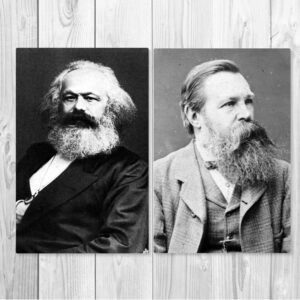
前の記事はこちら

関連記事
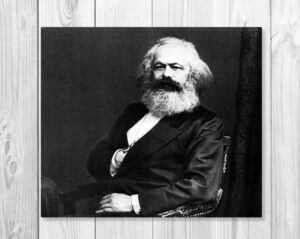
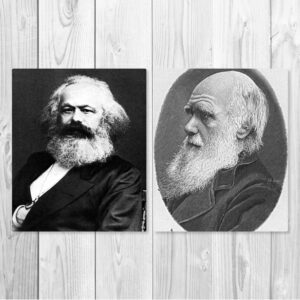



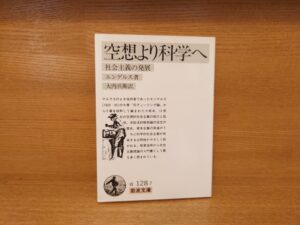

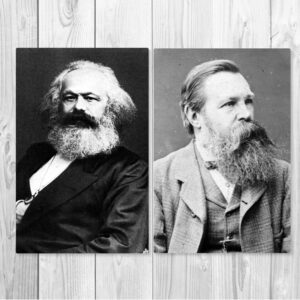
コメント